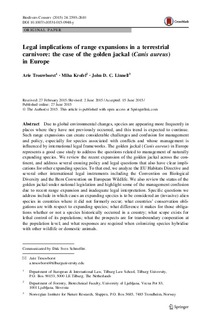Legal implications of range expansions in a terrestrial carnivore: the case of the golden jackal (Canis aureus) in Europe
Journal article
Permanent lenke
http://hdl.handle.net/11250/2396544Utgivelsesdato
2015Metadata
Vis full innførselSamlinger
- Publikasjoner fra CRIStin - NINA [2364]
- Scientific publications [1392]
Sammendrag
Due to global environmental changes, species are appearing more frequently in
places where they have not previously occurred, and this trend is expected to continue.
Such range expansions can create considerable challenges and confusion for management
and policy, especially for species associated with conflicts and whose management is
influenced by international legal frameworks. The golden jackal (Canis aureus) in Europe
represents a good case study to address the questions related to management of naturally
expanding species. We review the recent expansion of the golden jackal across the continent,
and address several ensuing policy and legal questions that also have clear implications
for other expanding species. To that end, we analyze the EU Habitats Directive and
several other international legal instruments including the Convention on Biological
Diversity and the Bern Convention on European Wildlife. We also review the status of the
golden jackal under national legislation and highlight some of the management confusion
due to recent range expansion and inadequate legal interpretation. Specific questions we
address include in which cases an expanding species is to be considered an (invasive) alien
species in countries where it did not formerly occur; what countries’ conservation obligations
are with respect to expanding species; what difference it makes for those obligations
whether or not a species historically occurred in a country; what scope exists for
lethal control of its populations; what the prospects are for transboundary cooperation at
the population level; and what responses are required when colonizing species hybridise
with other wildlife or domestic animals.

